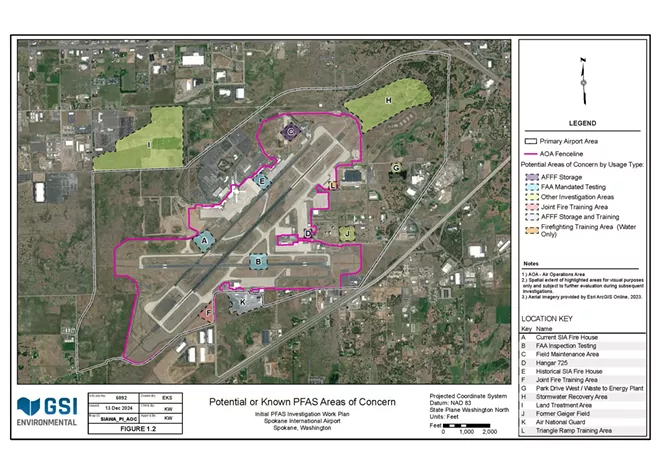Spokane International Airport’s Initiative to Address PFAS Contamination
Introduction to the PFAS Investigation at Spokane International Airport
Recently, Washington’s Department of Ecology approved a comprehensive “preliminary PFAS investigation work plan” for Spokane International Airport. This critical step follows increasing concerns regarding the presence of PFAS, commonly referred to as “forever chemicals,” on airport grounds.
The Framework of the Investigation
On December 13, 2022, a detailed plan formulated by GSI Environmental—a consultant engaged by the airport—was endorsed. This investigation primarily targets the potential contamination stemming from aqueous film-forming foam (AFFF), which has been utilized for years by airport firefighting teams in combating aviation fuel fires. In light of historical regulations mandating AFFF storage at all airports, initial investigations emerged after Fairchild Air Force Base reported similar findings of these chemicals in local wells.
By early February, testing efforts will commence across 52 pre-existing groundwater monitoring wells and at 57 designated soil sampling sites situated throughout the airport property. These tests will explore varying depths in both soil and water sources.
Next Steps Following Testing Completion
This phase signifies merely an exploratory stage; following this testing period mandated by Ecology, an extensive “remedial investigation” document must be compiled by airport officials detailing any contamination discovered.
Upon completion of preliminary tests within four to six weeks post-collection analysis in laboratories, results will be compiled into a report that is due for submission to Ecology within thirty days thereafter. As Jeremy Schmidt—Ecology’s overseeing manager on this project—states: “We are just scratching the surface regarding our understanding of contamination risks associated with this site.”
Uncovering Past Assessments
Accompanying GSI’s documentation are prior test outcomes from March 2024; however, those were obtained prior to Ecology instigating an enforcement order pressing further inquiry into PFAS levels at this location. Interested individuals can view these results along with insights about ongoing investigations through apps.ecology.wa.gov/cleanupsearch/site/16774.
Planning Future Investigations
Given that existing groundwater monitoring well installations predate awareness surrounding PFAS hazards, Schmidt notes additional wells may need establishment targeted toward identified usage sites or storage areas linked to these substances.
The objective is that before year-end arrivals occur with a draft remedial investigation proposal submitted to Ecology detailing strategies for more comprehensive probes into pollution levels present on-site. Once extensive evaluation exposes precise dimensions surrounding contamination challenges identified later during testing phases, collaborative efforts between Ecology and authorities governing airport operations can yield actionable cleanup strategies.
Potential Interim Measures and Community Impact
Should pending assessments unveil urgent threats such as off-site water contamination affecting public health adversely—particularly drinking supplies—the operators co-managing Spokane International Airport—including both Spokane County and city officials could find themselves liable for financing remedial measures such as community water purification systems according contractual obligations upheld towards citizens residing locally affected directly or indirectly through contaminated environments.
